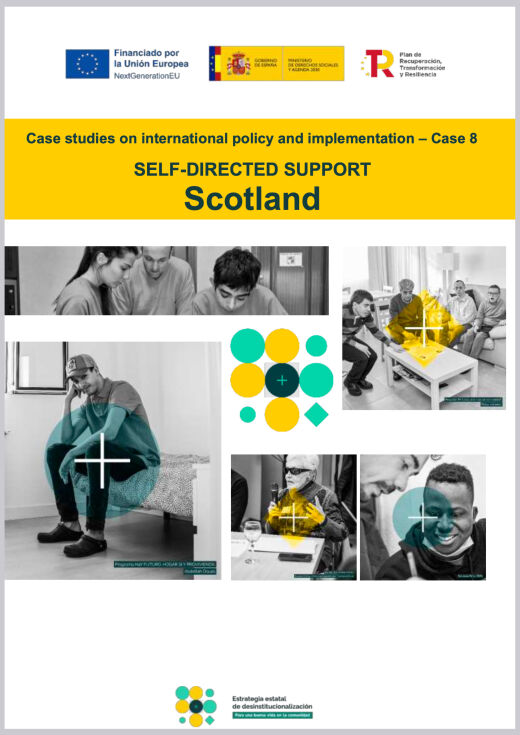Home / Library & Resources / Self-Directed Support Scotland
There has been significant progress in Scotland in reforming disability services, but major challenges remain.
Author: John Dalrymple
This paper was commissioned and published by Fresno as part of their work to support progress on deinstitutionalisation in Spain. John Dalrymple, who has been a leader and champion of many of the changes seen in Scotland outlines the history of deinstitutionalisation and the emergence of self-directed support as a key operating system for the future.
These are some of the key lessons that are described at the end of the report:
1. Self-directed support is not an end in itself but a means to the end of full citizenship for those who are typically excluded.
2. The underpinning ideology of self-directed support has much in common with the basic values and principles of good social work practice.
3. But when mainstream social work practice is embedded within the state structures of local government those values are vulnerable to compromise.
4. In particular the shared social work roles of enabler and gatekeeper appear incompatible, with the role of gatekeeper seemingly always likely to hold sway.
5. While self-directed support had its origins in Scotland prior to the devolution settlement of 1998 it gained considerably more momentum and official recognition following the re-establishment of the Scottish Parliament.
6. Devolved government in the UK has characteristics similar to the asymmetric system of devolution to the autonomous communities of Spain.
7. Innovation in social care (and especially in the area of greater empowerment of the individual with disabilities) more typically takes place in the so-called “third sector” rather than in the public or private sector (cf. concepts such as “individual service funds”, “self-directed support”, “separation of housing and support”).
8. However, the greatest single step towards a more comprehensive system of self-directed support (the Direct Payments legislation of 1996) resulted directly from the activist and campaigning activities undertaken by people with disabilities themselves over several decades.
9. Professional “third-sector” leadership in the development of self-directed support on behalf of those persons with disabilities least able to articulate their own concerns independently is a double-edged sword – the advantages gained having to be balanced against the dilution (real or perceived) of citizen leadership.
10. Change in the direction of greater power, choice and control on the part of citizens is possible.
11. But the process of change is slow and complex.
12. And the process of change is not linear – there are many ups and downs.
13. Further, the process of change relating to the most disabled and stigmatised members of society is particularly slow and vulnerable to setbacks – as per the thesis of Wolfensberger et al. – negative attitudes to disabled people are historically enduring and deep-seated societally.
14. The passing of legislation does not of itself guarantee compliance with that legislation.
15. Organisational and professional resistance to the full implementation of new legislation is capable of subverting the intention of the legislation.
16. Such resistance can have several causes e.g., the influence of previous custom and practice, the scale of the change required by the legislation, reluctance (whether conscious or otherwise) on the part of social work and finance managers to commit to the transfer of power and control the legislation implies.
17. The failure to embed in legislation the principle of accountability – together with a strong mechanism to give effect to accountability - increase the difficulties experienced by individuals, families, and their advocates in having the rights established for them in legislation properly acted upon.
18. The impetus to rectify well-documented problems with proper legislative implementation is often readily diffused by the distraction of coincidental organisational changes (or proposed changes) perceived to be of greater interest or importance to those involved.
Citizen Network is working closely with partners in Spain, like Plena Inclusion and Aprocor to advance deinstitutionalisation, self-directed support and citizenship for all.
Read and download the free pdf in your browser, link below.

The publisher is State Secretary of Social Rights, Government of Spain. Case 8 Self-Directed Support Scotland © State Secretary of Social Rights, Government of Spain 2023.